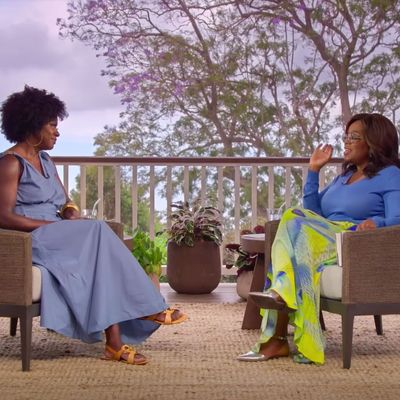
On Friday, Netflix released Oprah’s exclusive interview with actress and soon-to-be author Viola Davis. In their intimate conversation, Davis talked about her forthcoming memoir, Finding Me, which comes out April 26, delving into some of the stories she shares in the book.
Davis joins Adele, Prince Harry, and Meghan Markle as the latest subject in a series of high-profile interviews Oprah has done over the past year. Like her previous conversations, Oprah’s interview with Davis is raw and emotional, with much of the special focused on devastating details of Davis’s childhood. Here, some of the biggest takeaways from the conversation between Oprah and Davis.
The pandemic spurred Davis to write her memoir.
“I believe I was having a bad existential crisis,” Davis said, adding that at the time, she was struggling to find connection with the rest of the world and meaning in her life. Though this was something she said she began feeling before lockdown, “the pandemic exacerbated it.”
Davis explained how she expected the level of fame she’d achieved to bring her joy and satisfaction, “like Cinderella when Prince Charming comes in.” However, she said, “that didn’t happen.” Instead, she felt “exhaustion” and the pressure of people seeing her as a “commodity.” So, she said, she asked herself, “What’s home to you, and how do you get at it?” When she wasn’t able to answer that for herself, “the only thing I could think to do was to go back to the beginning of my story.”
Davis had to unpack the trauma of her childhood in order to move forward.
Growing up in Rhode Island, Davis and her siblings experienced racism, extreme poverty, and sexual abuse, the latter of which she’s previously talked about at length. Her life at home was violent, and the living conditions were devastating. “The rats were so bad, they ate the faces off my dolls,” she said, adding that, as a child, she was scared to go into the kitchen because it had become so infested. Davis’s life at school was overshadowed by classmates who tormented her, threw bricks at her, and called her racial slurs. “As much as I tried to put on this mask of bravery, of confidence,” Davis said, she still felt like “the damaged little girl who really, really believed she was ugly, that she was not enough.” She continued, “That’s what defined me more than anything else.”
Eventually, Davis said she came to a crossroads while processing her past in therapy. She realized “you can stay there and be swallowed or you can move on. I choose to move on.”
Davis decided she was going to be an actress when she was 14.
Fourteen was a pivotal age for Davis. That year, she won a major art contest, spurring her ambitions to pursue acting: “I realized I really wanted out, and I saw a way out.” When she was younger, Davis said, she thought she was “cursed.” “I was like ‘Where’s my sunlight?’” she recalled, before eventually finding that sunlight from within, recognizing her own aspirations to be an actor. “I needed a dream like I needed food and water,” she said. “That dream wasn’t just a goal; that dream was my way out.”
Davis felt a lot of shame surrounding her past.
Davis recalled having an adult at school explain to her how she should clean herself, something she didn’t have the resources to do at home. “I didn’t have the tools to figure it out on my own,” she said. “Then I was ashamed that I didn’t have the tools … so all I could do was swim in the shame.” However, she found hope in adults who reached out to her, like a teacher who gave Davis her daughter’s hand-me-downs. “You find people in your life who love you,” she said. “They give you permission to be able to love yourself.” That permission was life-changing for Davis. “When you are in the face of compassion and empathy, it’s amazing how it kills shame,” she said. “Because you’re seen for something way for valuable than your circumstance.”
Davis has found self-love in “owning her story.”
“This book is my gift to others,” she said, speaking to the validation that comes with feeling “seen” by the people around you. At the end of their conversation, Oprah asks what Davis is now “living for.” “I’m living for my peace and my joy,” Davis said, tearfully. “I want to be happy.” Oprah, also holding back tears, said, “In finding yourself, you have helped all of us.”

